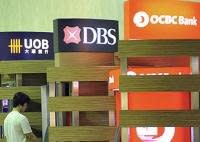Singapore banks' housing credit quality to stay benign: analyst

But they're safe for now.
According to Maybank Kim Eng, at this juncture, there are no signs of asset quality stress.
They expect the current benign credit environment to persist. In addition to the reasons cited above, we expect support would also come from the following.
Here's more from Maybank Kim Eng:
The strong financials of the property sector, which are in better shape now than prior to the 2008-2009 global financial crisis.
Continued strong job creation, spurred by a modest 3.7% GDP growth for Singapore. As long as employment remains high, there is little reason for a spike in housing NPL ratio.
Modest earnings impact. To quantify the potential impact of higher housing NPL ratio on bank earnings, we conducted a sensitivity analysis based on the following assumptions:
Based on our estimates and assuming housing NPL ratio jumps to 2% (from 0.5% average for our coverage universe as at end-Dec 2013), the banks could see earnings contract by up to 3%. If housing NPL ratio were to climb to 4%, earnings could decline by up to 6%.
More From Singapore Business Review

 Yahoo Finance
Yahoo Finance 
